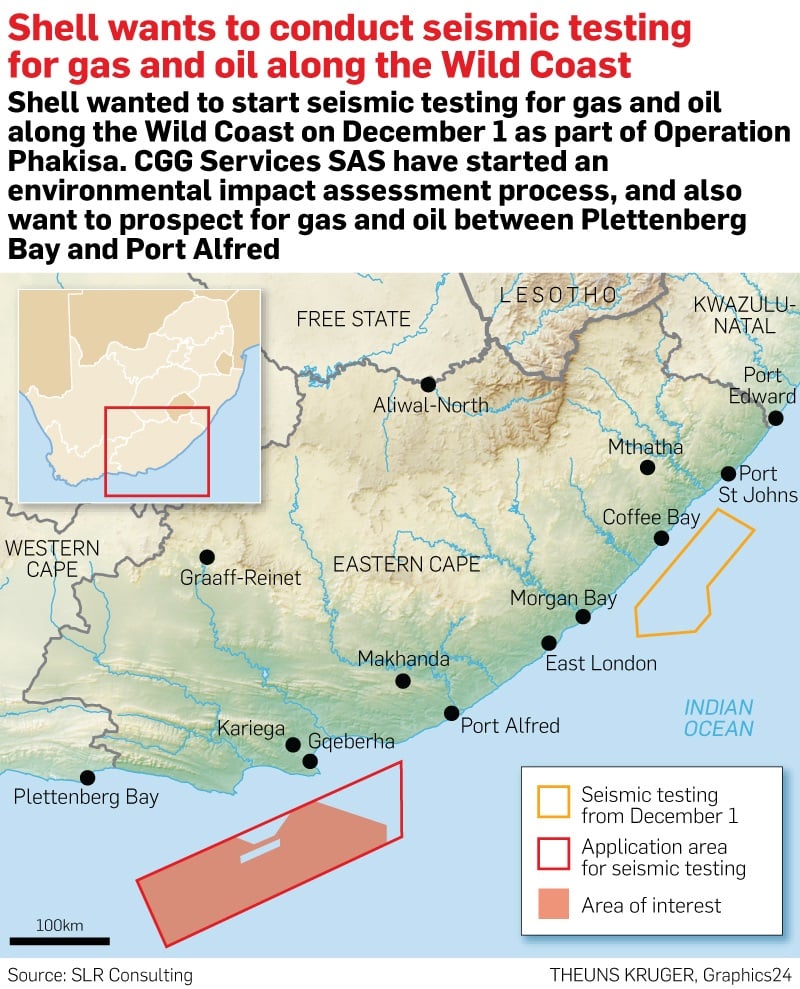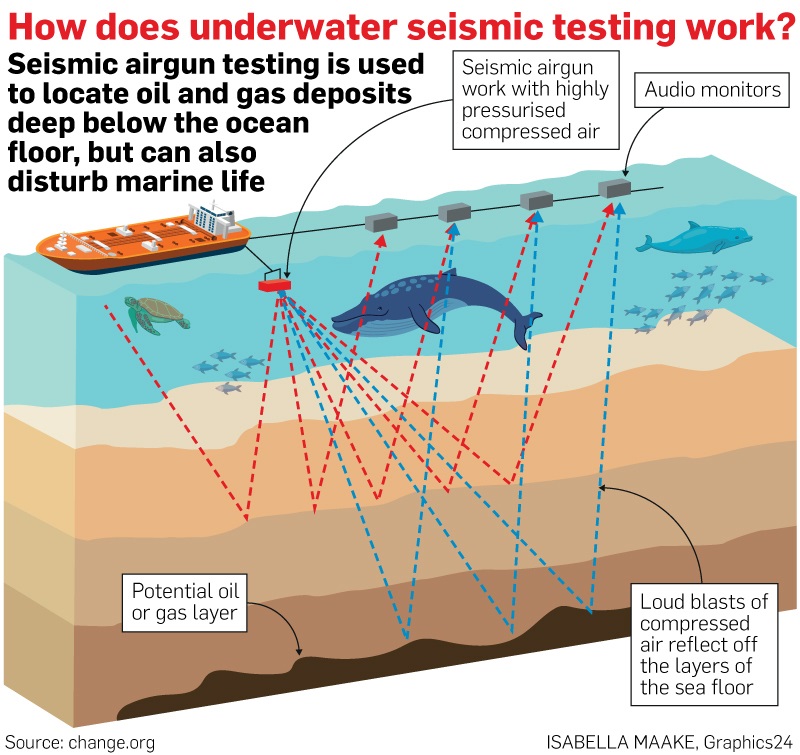- By: News
- 0 comment
The Grahamstown High Court has dismissed an urgent application by four environmental and human rights organisations that sought the court to prevent Shell from conducting seismic surveys in the Wild Coast.
Acting Judge Avinash Govindjee dismissed the application with costs, including the cost of two counsels.
The applicants – Border Deep Sea Angling Association, Kei Mouth Ski Boat Club, Natural Justice and Greenpeace – approached the court on Tuesday for an interim interdict against Shell to prevent the company from conducting seismic blasting along the Eastern Cape coastline.
The urgent court application came against the backdrop of a number of protests throughout the country and online petitions from ocean lovers to prevent the activity.
The applicants argued that the ecologically diverse and sensitive marine environment of the Wild Coast would be harmed and cause irreparable damage.
READ: Ocean lovers take Shell to court in a bid prevent it from seismic blasting on Wild Coast
The applicants told the court that in their view, the commencement of the seismic exploration activities was prima facie unlawful until Shell applies for, and obtains, the necessary environmental authorisation in terms of the National Environmental Management Act.
In delivering his judgment, which lasted less than 40 minutes, during a virtual sitting of the Grahamstown High Court in Makhanda on Friday morning, Govindjee said: “I must exercise a discretion to reject the application.”
He said the applicants’ submission of irreparable harm and the detrimental impact to the environment that could be done by the seismic survey to maritime life in particular were speculative at best.
“I accept that the applicants are of the firm view that seismic surveys would cause irreparable harm. Objectively speaking, however, and considering the limited material which supports the applicants’ contention on this point, a reasonable apprehension of irreparable harm has not been established,” said Govindjee.
During the hearing on Tuesday, the applicants’ advocate, Willie Duminy, argued that the approved environmental management programme [EMPr] for the seismic surveys made it clear that the survey should not be undertaken during December unless that cannot be avoided, and that Shell had not established that undertaking it now was unavoidable.
Furthermore, he said, the necessary mitigation measures were not taken – particularly that many fishing organisations were not informed of the surveys as the EMPr requires – and there is no evidence of any attempt to identify and inform potential interested and affected parties.
But Judge Govindjee rejected this view and said in court papers that here was no basis that a detailed mitigation strategy emanating from a 600-page EMPr was inadequate.
He said Shell was obliged to ensure that its activities remain in the low-risk band in terms of the EMPr.
“There is also no merit in the suggestion that the EMPr must be read to prohibit seismic surveys in the month of December.” The judge said:
He said this does not suggest there is no risk to marine life at all, but that is not the test. He accepted that the applicants did not only act in their own interests, and the interest of their members, but in the interest of the broader community and public at large.
“Any likely harm to the environment must therefore weigh in their favour. The issue of the likelihood of harm cannot, however, be considered on a worst-case scenario basis and separate from the range of mitigation imposed by the EMPr to be implemented by Shell.”
“The evidence before me demonstrates a significantly reduced likelihood of environmental harm in those circumstances without suggesting full proof of elimination of risk.”
“By contrast, granting an interdict pending a review would result in Shell missing an opportunity to complete the survey in the current seismic window,” he said.
He added that this could have a range of consequences, including compromising Shell’s interests in exploration rights and in its breach of contracts and obligations.
He said:
The judge said the applicants failed to convince him that there was a well-grounded apprehension of irreparable harm if interim relief was not granted and the ultimate relief was actually granted, or that the balance of convenience favours them.
“There is an increasing global concern about the environment which we live in, for all creatures, small and great. This case was not about the full exercise of the exploration right and the implications of that for the environment.”
“The question was whether the seismic survey to be undertaken should be interdicted pending the final determination of a separate review application. That question has been answered to the negative,” said Judge Govindjee.
The applicants said the judgment was a massive blow for the Wild Coast and that they would be discussing it with their legal advisers with a view to deciding whether or not to apply for leave to appeal against aspects of the judgment.
“The decision to allow Shell to continue with its plans to destroy the Wild Coast is very disappointing. Not only will the blasting destroy precious biodiverse ecosystems, but it will also destroy the livelihoods of local communities, all in the name of profit,” said Happy Khambule, a senior climate and energy campaign manager for Greenpeace Africa.
“We will continue to support the nationwide resistance against Shell and pursue the legal avenue to stop it. We must do everything we can to undo the destructive colonial legacy of extra-activism, until we live in a world where people and the planet come before the profits of toxic fossil fuel companies.”
Pooven Moodley, an executive director of Natural Justice, said the outcome was very unfortunate, especially since the judge did not recognise the urgency of the interdict and the immediate threat the seismic surveys pose on the environment, marine life and local communities. Moodley said:
“As activists, civil society and lawyers, we cannot relax; the climate crisis is upon us, and fossil fuel companies accelerating the crisis are posing a serious threat to the planet, our livelihoods, human rights and very existence. We will fight them on the beaches and in court,” Moodley said.
John Rance, the chairperson of Kei Mouth Skiboat Club said: “Unthinkable! We are saddened by the result, but happy that we did all we could under the circumstances. The seismic survey may go ahead, but there’s going to be one helluva shindig before mining starts.”
“Shell and its shareholders should be ashamed of themselves. We should all be telling our investment advisors and pension funds to disinvest from Shell. It’s the only language they understand.”
Meanwhile, on Thursday, Sustaining the Wild Coast (SWL) and several Wild Coast communities filed separate court papers seeking to interdict Shell’s seismic survey in the area.
Sinegugu Zukulu, speaking on behalf of SWC, said: “Our application for an urgent interdict is based on the simple fact that Shell does not have environmental authorisation in terms of the National Environmental Management Act for this survey. We know that this survey was approved in 2014, but it is now 2021 and we need to ensure that any illegal offshore exploration is not allowed by our government through negligence or misinterpretation of changes in law since 2014. We are calling for an immediate halt to the survey and that no seismic surveying be allowed without a proper environmental authorisation.”
SOURCE:
https://www.news24.com/citypress/business/human-rights-organisations-lose-out-in-bid-to-stop-shell-from-seismic-exploration-of-wild-coast-20211203





